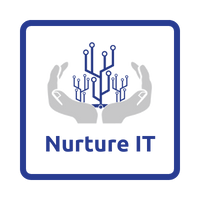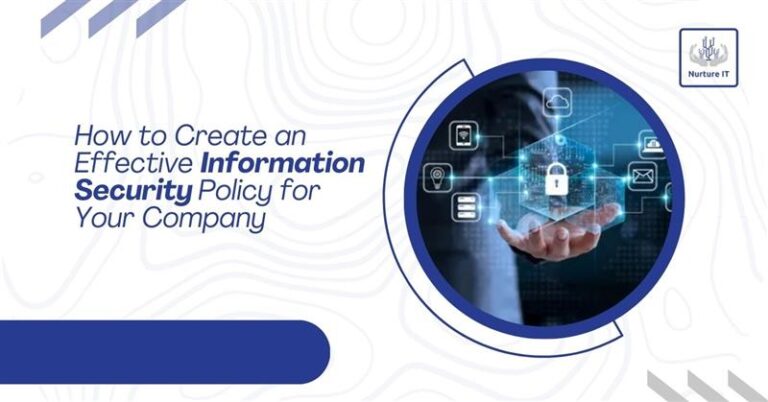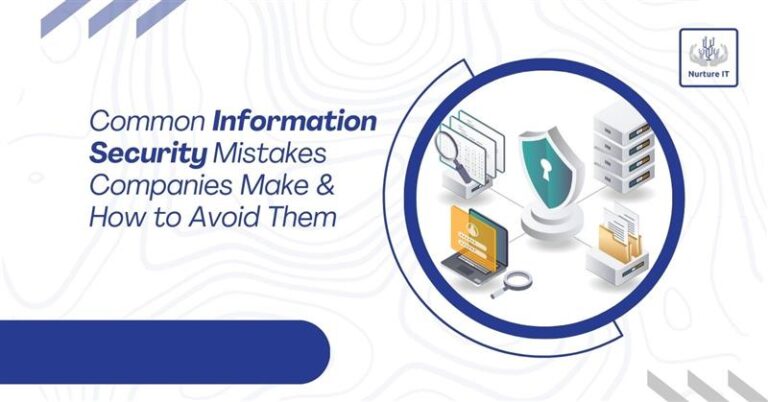Information Security : Elevating Your Understanding Beyond Basic Limits 1
In today’s digital age, the term “Information security” holds paramount importance, resonating across industries and sectors worldwide. It encompasses the practices, processes, and technologies employed to protect sensitive data, systems, and networks from unauthorized access, misuse, or destruction.

With the increasing reliance on digital infrastructure for everyday operations, understanding the significance of Information security is more critical than ever before.
60 Percent Of Small Companies Close Within 6 Months Of Being Hacked
Data breaches are one of the top concerns for today’s organizations. The costs of these breaches continue to increase, with the average global cost of a single breach hovering at $3.62 million. Beyond the financial consequences, network security is also crucial because an attack can compromise customer trust.

In fact, 60 percent of small companies go out of business within six months of falling victim to a data breach or cyber attack. With both the financial security and future of your business on the line, it’s essential for organizations of all sizes to have measures in place to monitor suspicious network activity.
Of all cyberattacks, 43% target small businesses, SME Startups: Report
India boasts over 77,000 startups and 3.36 lakh Small and Medium Enterprises (SMEs), contributing 37.54% of GDP. As the country aims for a $5 trillion economy, these startups and SMEs are crucial to this goal. However, their minimal security infrastructure makes them highly vulnerable to cyberattacks. With increased digitalization, even simple emails can pose significant threats.

The CyberPeace Foundation, a leading non-profit focused on Information Security awareness, reports that 43% of all cyberattacks target small businesses and SME startups, highlighting the urgent need for robust Information Security measures in these sectors.
Study Reveals Surge in Cyber Attacks Amidst Shift to Remote Work Post-COVID
The shift to remote work after COVID-19 has led to a significant increase in cyber attacks. With employees working from home, often on less secure networks and personal devices, vulnerabilities have multiplied. Cybercriminals have exploited these weaknesses, launching more phishing attacks, malware, and ransomware campaigns.
According to Information Security reports, there has been a notable surge in these attacks, with phishing incidents alone increasing by over 600%. The lack of robust security measures in home environments has made it easier for hackers to infiltrate corporate networks, highlighting the urgent need for enhanced Information Security protocols for remote work setups.
Why is Information Security important?
In an era where data breaches have become increasingly prevalent, the importance of robust Information Security measures cannot be overstated. These breaches not only compromise sensitive information but also lead to significant financial repercussions for organizations.
According to a recent report by IBM and Ponemon Research Institute, Indian firms lost an alarming ₹176 million on average in the fiscal year 2021-22 due to data breaches, marking a substantial increase from previous years. The global average cost of a data breach has also surged to an all-time high, underscoring the pervasive impact of cyberattacks on businesses worldwide
It Causes Revenue Loss for Companies
Indian firms lost a staggering ₹176 million on average in the fiscal year 2021-22 due to data breaches. That’s a significant 25% increase from the previous year. And it’s not just India; globally, the average cost of a data breach has reached an all-time high of $4.35 million for organizations. These incidents aren’t just one-offs; a whopping 83% of organizations worldwide have experienced more than one data breach in their lifetime.

But here’s the kicker – the aftermath of these breaches is far from over. Nearly 50% of the costs incurred from a breach come more than a year after the incident. So, it’s not just a one-time hit; it’s a long-term financial burden. Post-breach response costs, including those for Indian businesses, continue to rise year after year. In fact, post-breach response costs for Indian businesses increased from ₹67.20 million in 2021 to ₹71 million in 2022, a substantial 5.65% jump. And let’s not forget about the other costs associated with data breaches – lost business, detection, and escalation. It’s a vicious cycle that’s costing companies dearly.
SMBs are Not Safe
Small and medium-sized businesses (SMBs) and startups, despite their burgeoning presence in the market, often overlook the importance of Information Security infrastructure. With limited resources and a focus on business growth, these entities become prime targets for cybercriminals.
Alarmingly, 46% of SMEs lack the necessary knowledge to manage cyber risks, leaving them vulnerable to attacks. The repercussions of cybercrime are particularly devastating for SMBs, with approximately 60% of affected enterprises ceasing operations within six months of a cyberattack.
Escalation in Number of Cyberattacks after WFH Started
The shift to remote work in the wake of the COVID-19 pandemic has exacerbated Information Security challenges, with a surge in cyberattacks targeting remote workers and home networks. As employees log in from personal devices and unsecured networks, hackers exploit vulnerabilities to infiltrate systems and compromise sensitive data.
This trend underscores the critical need for organizations to bolster their Cyber Security and Information security infrastructure and implement robust protocols to mitigate the risks associated with remote work.
How Cyber Attacks Usually Happen
Cyber attacks pose serious threats to Information Security systems, as individuals or organizations maliciously attempt breaches, often driven by financial gain or ulterior motives. Victims can range from individual users to enterprises and governments. Here are three common ways such attacks typically unfold:

1. Identity Theft
Identity theft occurs when an attacker steals personal information, such as login credentials, credit card numbers, or social security numbers, to impersonate the victim. This information can be obtained through various means, including:
- Phishing emails or websites that trick the victim into revealing sensitive data. In 2021, phishing attacks increased by 11% compared to the previous year.
- Malware that steals information from the victim’s device. Malware attacks cost businesses an average of $2.4 million per incident in 2021.
- Exploiting vulnerabilities in software or systems to gain unauthorized access. In 2021, the number of vulnerabilities disclosed increased by 19.7% compared to 2020.
Once an attacker has the victim’s identity, they can use it to commit fraud, access sensitive accounts, or even sell the information on the dark web.

2. Phishing
Phishing is a type of social engineering attack where an attacker sends fraudulent communications, often through email, that appear to be from a reputable source. The goal is to trick the victim into revealing sensitive information, such as login credentials or financial information, or to install malware on their device.Phishing attacks can take many forms, such as:
- Emails claiming there is a problem with the victim’s account and asking them to click on a malicious link or attachment. In 2021, 83% of organizations experienced phishing attacks.
- Fake websites that mimic legitimate ones to steal login credentials. Phishing websites increased by 29% in 2021 compared to the previous year.
- Targeted attacks, known as spear phishing, that use personal information to make the message more convincing. Spear phishing attacks have a success rate of up to 70%.
Phishing is an increasingly common threat, with attackers constantly developing new techniques to bypass security measures.
3. Internal or External Data Theft
Cyber attackers can steal sensitive data, such as intellectual property, customer information, or financial records, from both internal and external sources.
- Internal data theft can occur when an attacker gains unauthorized access to a company’s network through a compromised employee account or insider threat.
- Within the realm of Information Security, external data theft manifests when attackers exploit vulnerabilities in a company’s systems or supply chain. For instance, malicious code injected into a software update or compromise of a third-party vendor can grant access to the target organization’s data.
Once an attacker has access to sensitive data, they can use it for various purposes, such as:
- Selling the information on the black market. The average cost of a data breach in 2021 was $4.24 million.
- Holding the data for ransom in a ransomware attack. Ransomware attacks increased by 105% in 2021 compared to 2020.
- Disrupting the victim’s operations or reputation through data leaks or destruction. Data breaches exposed 22 billion records in 2021.
To safeguard against these cyber attacks, organizations must adopt robust Information Security measures, which we’ll delve into further now.
How can Nurture IT help ?
In an increasingly digital world, the protection of sensitive information has never been more crucial. As organizations navigate complex cyber threats and regulatory requirements, having a robust information security strategy is paramount to safeguarding valuable data and maintaining trust with stakeholders.
Further in this blog, we explore how Nurture IT goes beyond the basics to elevate your understanding of information security.
Access Management:
- Identity Access Management : Identity Access Management (IAM) is a framework of policies and technologies that ensure the right individuals have the appropriate access to technology resources. It involves managing digital identities, assigning user roles and permissions, and enforcing authentication methods like Multi-Factor Authentication (MFA). MFA adds an extra layer of Information Security by requiring users to provide multiple forms of verification before gaining access, such as a password, security token, or biometric verification.

- Firewall: Firewalls are essential components of network security that monitor and control incoming and outgoing network traffic based on predetermined security rules. Nurture IT offers various types of firewalls, including physical, on-premises, cloud-based, and device-based firewalls, tailored to meet your organization’s specific security needs.

- VPN: A Virtual Private Network (VPN) is a fundamental component of Information Security, creates a secure, encrypted connection over a less secure network, such as the internet. It allows remote users to securely access the organization’s network resources and services as if they were directly connected to the private network. Nurture IT provides VPN solutions designed to safeguard data transmission and protect sensitive information from unauthorized access.

- Active Directory: Active Directory (AD) is a directory service developed by Microsoft for managing network resources and user identities. It provides centralized authentication and authorization services, enabling administrators to control access to resources based on user permissions. Nurture IT offers Active Directory management services to streamline user authentication, group policies, and access controls within your organization’s IT infrastructure.

Data Management:
- Backup: Nurture IT emphasizes the importance of implementing a robust backup strategy to protect critical data from loss or corruption. We recommend the 3-2-1 backup rule, which involves keeping at least three copies of your data, stored on two different types of media, with one copy stored offsite. Additionally, we implement Write Once, Read Many (WORM) policies to prevent unauthorized modifications or deletions of data after it’s written to storage.

- IRMS – Information Rights Management: Information Rights Management (IRM) is a technology that allows organizations to control and protect the confidentiality, integrity, and availability of their sensitive information. Nurture IT offers IRM solutions to enforce access controls, encryption, and digital rights management policies, ensuring that only authorized users can access and use protected data.

- Recovery: In the event of a cyberattack or data breach, swift recovery is essential to minimize downtime and mitigate potential damages. Nurture IT helps organizations develop comprehensive emergency response plans and recovery strategies to quickly restore systems and data to a pre-attack state. Our proactive approach ensures that your organization can recover from security incidents effectively and resume normal operations without significant disruptions.

Data Protection:
- EPP / AV / USB BLOCKING: Endpoint Protection Platforms (EPP), Antivirus (AV) software, and USB blocking mechanisms are critical components of an organization’s defense against malware, viruses, and other cyber threats. Nurture IT deploys advanced EPP solutions, antivirus software, and USB blocking policies to detect, prevent, and mitigate security risks across endpoints and removable devices.

- MDM (Mobile Device Management): MDM solutions enable organizations to securely manage and control mobile devices, such as smartphones, tablets, and laptops, used by employees to access corporate data and resources. Nurture IT implements MDM technologies and policies to enforce security policies, encrypt data, and remotely monitor and manage mobile devices, safeguarding sensitive information from unauthorized access or misuse.

- DLP (Data Loss Prevention): Data Loss Prevention (DLP) technologies help organizations monitor, detect, and prevent the unauthorized transmission or leakage of sensitive data. Nurture IT implements DLP solutions to identify and classify sensitive information, monitor data flows, and enforce security policies to prevent data breaches and comply with regulatory requirements.

Conclusion:
By partnering with Nurture IT, organizations can leverage our expertise and comprehensive range of information security solutions to safeguard their data, mitigate cyber threats, and ensure regulatory compliance. Our tailored approach addresses the unique security challenges and requirements of each organization, empowering them to proactively protect their valuable assets and maintain a secure operating environment.
About Nurture IT
Nurture IT, one of the leading IT service providers in Bangalore offers customized scalable technology solutions specifically designed for our client’s unique needs. Our solutions accelerate growth, reduce costs, and enable collaboration. As a preferred partner to technology leaders like Microsoft and Cisco, we deploy the most advanced business technology solutions to ensure optimal reliability, productivity, and value.
Our B2B branch, Nurture IT, adeptly serves corporate and scaling-up demands. Conversely, for those not anticipating immediate growth, our Retail division – Laptop World caters to your specific needs. Make an informed choice aligned with your organizational trajectory and immediate necessities







